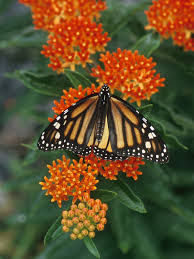Project Wingspan Collects Seeds for Pollinator Plants
NEWS FROM THE POLLINATOR PARTNERSHIP…
Project Wingspan Takes Flight Across Indiana
May 2019
The Pollinator Partnership is excited to announce they have been awarded another 2-year grant from the National Fish and Wildlife Foundation (NFWF) to continue their regional seed collection and habitat enhancement efforts for monarchs and now, the rusty patched bumble bee, in Indiana through their new initiative: Project Wingspan.

As you may know, the iconic monarch butterfly (Danaus plexippus) and its spectacular migration are in jeopardy. Their North American numbers have suffered a steep decline of approximately 90% over the past two decades, and in 2014 the U.S. Fish and Wildlife Service was petitioned to protect the monarch butterfly under the Endangered Species Act (with a listing decision expected for summer 2019). Like the monarch, the rusty patched bumble bee (RPBB) was a common species 20 years ago, with a range across 28 states and two Canadian provinces. RPBB (Bombus affinis) populations have also seen a swift decline since the 1990s, which earned it placement on the endangered species list in 2017 – with a distinction of becoming the first bee in the contiguous 48 states to be declared endangered. The species has now only been observed as a few small patches of populations across what is estimated to be only 0.1% of its historical range.
While there are many factors driving broad pollinator declines, one key cause for the reduction in pollinator populations is loss of habitat. As a result, Pollinator Partnership has joined forces with several organizations and agencies across IL, IN, MI, OH, PA, and WI to launch Project Wingspan and enhance the landscape of the Midwest to assist these struggling species.
Project Wingspan (PW) seeks to build off the success of its predecessor, Monarch Wings Across the Eastern Broadleaf Forest (MWAEBF), where Pollinator Partnership with an all-star team of collaborators and a dedicated volunteer base, were able to gather over 300 collections of seed from 20 different species of native host and nectar plants, train more than 320 volunteers in seed collection protocols, educate over 175 land managers in monarch habitat enhancement techniques, and secure over 24,000 long-term habitat acres across AR, IL, IN, MO, and OH.
If you are interested in joining the PW team to help improve the landscape for our imperiled pollinators, there are several ways you can get involved and make a difference!
- Sign up to become a seed collection volunteer or collection location.
- Participate in the online habitat survey.
- Spread the word! Let your friends, family, and colleagues know about this new and exciting opportunity.
Collecting Seed:
Wingspan partners have put a call out for enthusiastic seed collecting volunteers in all 6 states to help identify and collect milkweed and other common native forage plants. As a seed collecting volunteer you will be provided with training and be making valuable contributions to supporting migrating monarchs and the imperiled rusty patched bumble bee.
No seed collecting experience is required but basic plant knowledge is preferred. Training and seed collection will start in spring 2019, but you can get on the list now. To sign-up as a seed collector please e-mail Emily Yates (ey@pollinator.org) with your name, city, state, and preferred email address or fill out the online form here: https://tinyurl.com/Wingspan-volunteer. You will be added to their volunteer contact list and more information will follow soon.
Project Wingspan is also looking for landowners and public land managers with robust native plant populations, who are interested in supporting local habitat restoration efforts by serving as native seed collection sites. To see our list of target plants and sign-up as a seed collection location please fill out the online form here: https://tinyurl.com/PWseedsite.
Habitat Wanted:
Project Wingspan will work to document, secure, and enhance monarch, rusty patched bumble bee, and other rare pollinator habitat. Public land managers and private land stewards (with at least one acre of land) who are committed to long-term habitat conservation are invited to participate. To join in this effort, complete the preliminary online survey. Selected sites may receive a free on-site review by Pollinator Partnership’s Monarch & Pollinator Habitat Coordinator and may be eligible for native plant material awards.
Deadline: June 15, 2019. Please visit https://pollinator.org/wingspan/survey
For questions please e-mail Elizzabeth Kaufman at ek@pollinator.org
Spread the Word:
Who can get involved? Just about anyone! This project is a great opportunity for Master Gardeners, Master Naturalists, park friends groups, naturalists, native plant societies, public and private land owners/managers, universities, community organizations, natural resource students & professionals, and others to engage with their local community, support imperiled pollinators, and gain valuable skills. While seed collection in the field is best suited for those with attention to detail and the ability to navigate uneven terrain, opportunities to help clean seeds may be available with some teams for volunteers of all ages.
Please consider joining the Project Wingspan team and help us save these imperiled pollinators from disappearing from our landscapes forever. Together, we can make a difference!
“Never doubt that a small group of thoughtful, committed citizens can change the world; indeed, it’s the only thing that ever has.” – Margaret Mead
For more resources on how you can help pollinators, visit:
Pollinator Partnership: www.pollinator.org
Selecting Plants for Pollinators: https://pollinator.org/guides
Monarch Wings Across America: www.pollinator.org/monarchs
Learning Center: https://pollinator.org/learning-center
Bee Friendly Farming: https://pollinator.org/bff
——————————————————–
Pollinator Partnership is a nonprofit 501(c)3 organization and the largest in the world exclusively dedicated to the protection and promotion of pollinators and their ecosystems. The Pollinator Partnership’s mission is to promote the health of pollinators, critical to food and ecosystems, through conservation, education, and research. Signature initiatives include the NAPPC (North American Pollinator Protection Campaign), S.H.A.R.E., National Pollinator Week, and the Ecoregional Planting Guides.
For more information about Pollinator Partnership:
Tel: 415-362-1137
Email: info@pollinator.org
Website: www.pollinator.org
